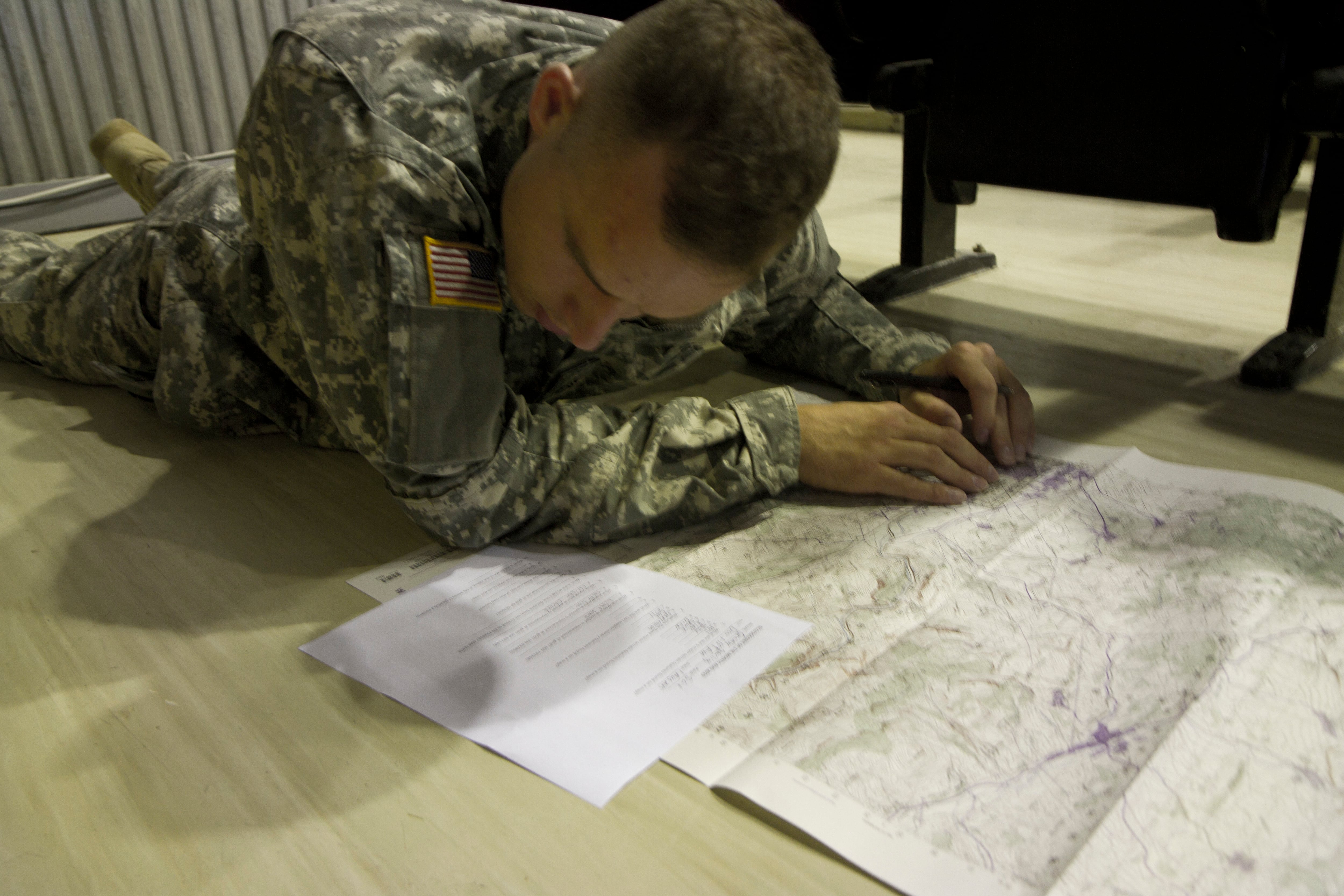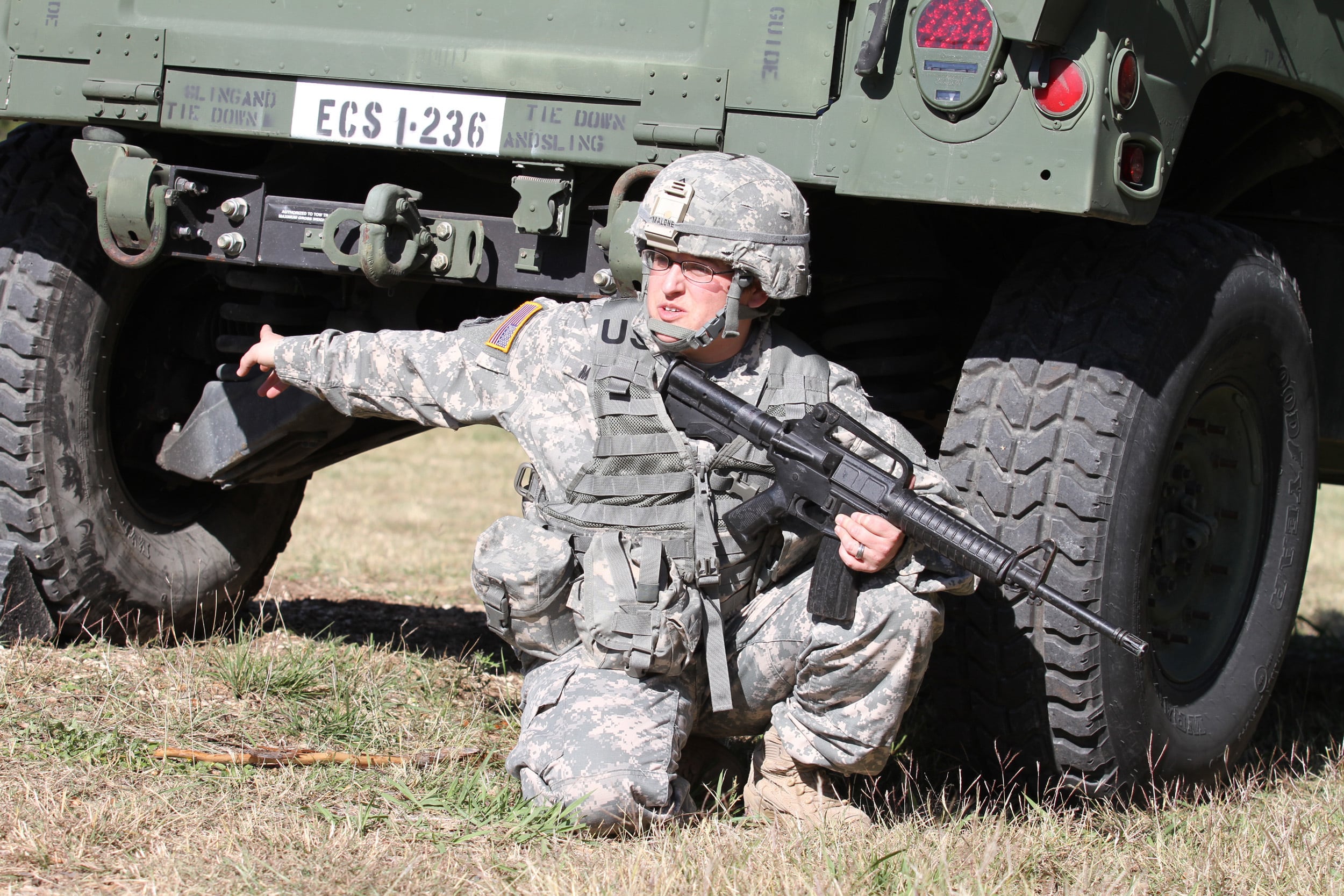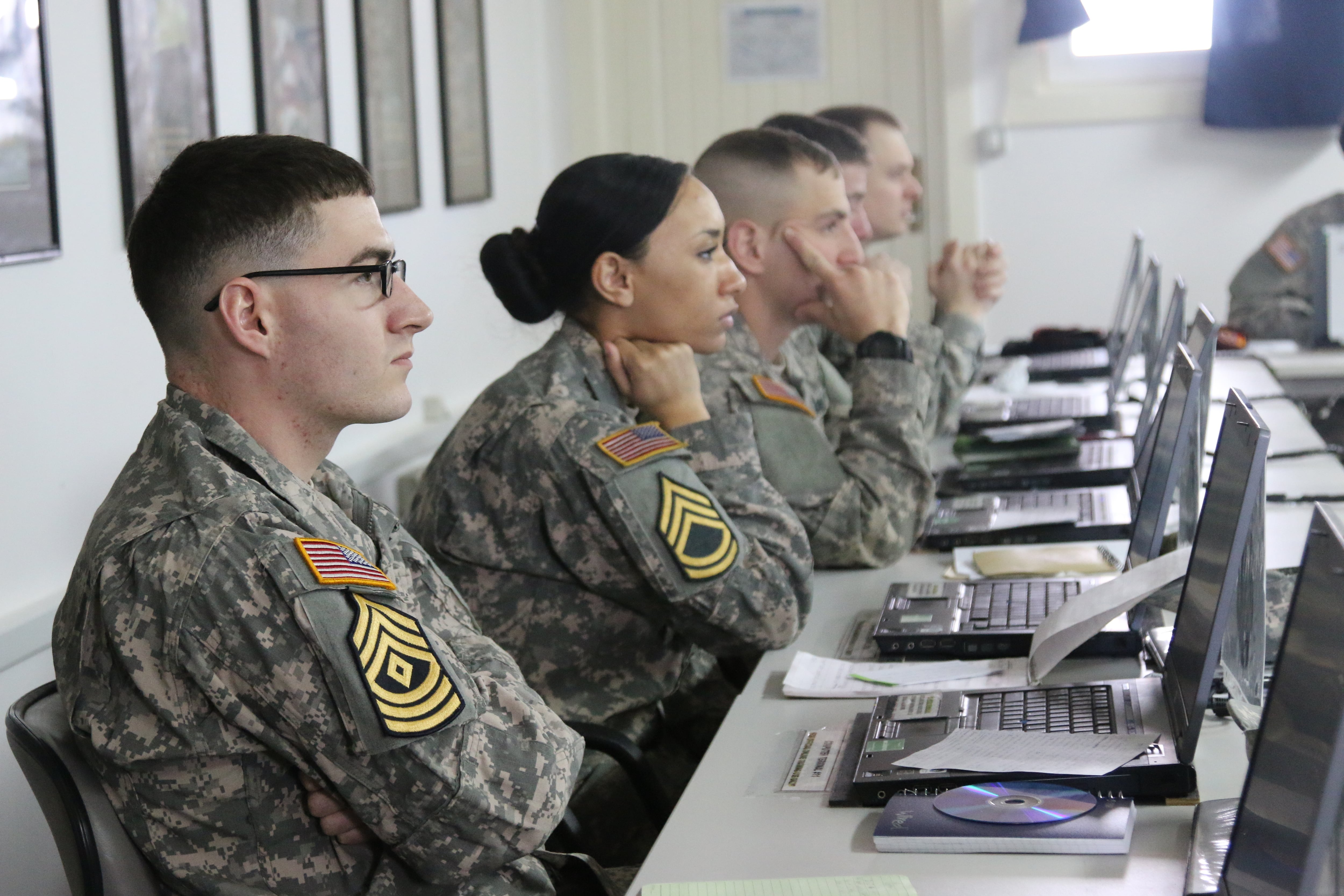Starting Jan. 1, soldiers must meet new education requirements to get promoted to sergeant and staff sergeant.
These troops will also have to contend with a revised promotion point chart — one that favors soldiers with more education and better PT, marksmanship and foreign language skills.
Under the revised chart "combat experience" will no longer earn you extra points.
The changes are the first phase in a three-phase strategy to expand STEP among the NCO ranks. STEP stands for "select, train, educate and promote."
Later in 2016, education requirements will also become mandatory to make sergeant first class. STEP extends to master sergeant promotions in 2017.
"This is not just a specialist to sergeant requirement," said Sergeant Major of the Army Dan Dailey. "Every NCO will have to follow STEP, so that's a major change."
"We want to make sure that (the soldiers) leading the men and women of our nation are fully trained, and that they have the proper education and experience to handle whatever mission or complexities they may face," said the Army's senior-ranking enlisted soldier.
The promotion requirements approved by senior Army leaders expand on the select, train, educate and promote procedures now used for advancements to sergeant major.
The timing of the master sergeant requirement is contingent upon the fielding of a new NCO Education System course for promotable sergeants first class. Barring unexpected delays, the school requirement, to be called the Master Leader Course, will apply to soldiers recommended for promotion by the master sergeant board that meets in early 2017.
STEP was added to the senior NCO professional development track in 2008 with policies that require master sergeants to be competitively selected for the Sergeants Major Course, and to graduate from the 10-month resident course, or the non-resident SMC, before being scheduled for promotion to sergeant major.
"STEP is based on the concept that soldiers have achieved full competency in their current grade and military occupational specialty, and they have the potential to serve at the next higher grade," said Gerald Purcell, a policy integrator in the enlisted division of the Directorate Military Personnel Management, Office of the Army G1 at the Pentagon.

Under the revised promotion point chart, soldiers are rewarded for having more civilian education.
Photo Credit: Sgt. Erick Yates/Army
"It is done at the organizational (unit) level for promotions to sergeant and staff sergeant, and by centralized boards for sergeant first class and above," Purcell said.
Dailey said Army leaders were driven to expand STEP to make sure that people who wear NCO insignia, and who lead troops every day, measure up to Army standards.
"Being qualified at your skill level and military occupational specialty requires a complement of all three leadership development domains – institutional, operational and self-development," Dailey said. "In the past we have allowed people to attain the rank, in some cases two ranks, above their institutional experience. That is not the case now."
Linking NCO education to promotion better prepares NCOs "for the complexities of today's operational environment," said Secretary of the Army John McHugh in approving the promotion changes Aug. 13.
Self-structured work
The STEP policies that take effect Jan. 1 for sergeant and staff sergeant in the Regular Army and Army Reserve, and later in 2016 and beyond for the senior ranks, complement changes made last year that require soldiers to complete an appropriate Structured Self Development course to be considered for promotion to sergeant and above.
The Structured Self Development courses are delivered online, and consist of 80 hours of study on Army topics unrelated to a specific MOS.
Under the 2014 changes that remain in effect, SSD-1 is a requirement to be boarded for selection to sergeant, SSD-2 for staff sergeant, SSD-3 for sergeant first class and SSD-4 for master sergeant.
SSD-5, a new course, will become a requirement to be boarded for selection to nominative command sergeant major and sergeant major duties in fiscal 2016. Nominative positions are for the E9s who serve as senior enlisted advisers to general officers.

Changes to NCO promotions also impact Reserve and National Guard soldiers.
Photo Credit: Staff Sgt. Emily Anderson/Army
Under the STEP process that takes effect for January promotions, corporals and specialists who want to become sergeants will have to complete SSD-1 before being recommended and boarded for promotion by their chain of command.
"For a soldier to be even considered to be promoted, we're saying he or she has to meet Army standards," said Command Sgt. Maj. David Davenport, sergeant major of the Training and Doctrine Command.
Details for sgts., staff sgts
Commanders and senior NCOs in units will continue to play a critical role in assessing a soldier's readiness for boarding and promotion to sergeant and staff sergeant.
Soldiers who are selected for promotion, and who subsequently make a monthly cutoff score, will have to complete the Warrior Leader Course for promotion pin-on to sergeant, and the Advanced Leader Course for staff sergeant.
"While we will allow a soldier to attain promotable status under the same rules as in the past, it changes when that soldier has to complete the formal military education course for actual promotion to the next higher grade," Purcell said.
"For example, the specialist who is a SSD-1 graduate, and who meets the time-in-service and time-in-grade requirements for promotion to sergeant, and who is recommended for promotion by his or her commander, is eligible to be boarded," he said.
The board will have a validating vote of yes or no, just as today. If the board votes yes, the soldier is placed on the service-wide E5 recommended list, and will compete for promotion against other soldiers of his or her MOS.
"Each month we establish promotion requirements across the Army by MOS and grade," Purcell said.
"If a soldier is an 11B (infantryman) specialist, and we have a requirement to promote 100 11Bs to sergeant during a particular month, we will take the Army-wide order of merit list for that MOS, and promote 100 soldiers with the most promotion points."
"That is the process now, and that will be used in the future, except that all soldiers identified for promotion during a given month must be graduates of the Warrior Leader Course," Purcell said.
"We will have a filter in place that will take the name of a soldier off the monthly promotion list if he or she has not graduated from the WLC."
"They will be skipped, even if they have more points than other soldiers of their MOS because they will not be considered fully qualified for promotion," he said.

A soldier participates in the Warrior Leader Course.
Photo Credit: Staff Sgt. Joseph Rivera Rebolledo/Army
"The final promotion list will have the name of the top 100 11B promotable specialists who are graduates of the Warrior Leader Course, and who are fully qualified for promotion."
Soldiers who are passed over because they lack the WLC requirement will remain on the recommended list.
"When they graduate from the Warrior Leader Course they will be considered fully qualified for promotion, and will be eligible to compete for promotion against a future requirement," Purcell said.
Promotions will take effect on the day the soldier pins on the higher rank. They will not be backdated to when the soldier first met the cutoff score.
Sergeants will have to complete SSD-2 to be recommended for promotion to staff sergeant, and then the Advanced Leader Course to qualify for promotion pin-on.
Some of these policies have been adjusted for Army National Guard soldiers.
Beginning with the fiscal 2016 promotion cycle, soldiers on a promotion list who have completed their Structured Self-Development requirements can be selected and assigned to higher grade vacancies, according to McHugh's directive.
Soldiers who have not met the NCO Education System requirement for promotion will have 24 months to complete the required course for promotion pin-on, or they will be removed from the higher-grade position.
Soldiers will be authorized a 36-month extension when their required course has three or more phases.
Similar to the Regular Army, promotion pin-on eligibility for Guard soldiers will require completion of the Warrior Leader Course for sergeant, the Advanced Leader Course for staff sergeant and the Senior Leader Course for sergeant first class.
Promotion point changes
To support transition to the new system, several changes will be made to the matrix used to calculate promotion points for advancement to sergeant and staff sergeant.
The Army will retain the 800-point format for the Promotion Point Worksheet, but will eliminate the points currently available in the "military education" section of the worksheet for completion of the Warrior Leader Course and Advanced Leader Course, as these will be requirements for promotion to sergeant and staff sergeant.
The Army also will eliminate the points (60 maximum for sergeant, and 90 maximum for staff sergeant) that are available for combat experience.
(*The Army has set promotion point caps for some categories.
**SH stands for "semester hour" )
[Editor's note: What do you think of these changes? Send your thoughts to Managing Editor Tony Lombardo at tlombardo@armytimes.com.]
This sub-category of "military training" was added to the matrix during the days of heavy deployments to Iraq and Afghanistan when many thousands of soldiers were unable to add points for certain military and civilian education achievements because of their operational duties.
"We had to retool the semi-centralized promotion point worksheet…and were able to harvest those points (previously awarded for NCOES) and spread them out in other areas," Davenport said.
Under the current system, promotable specialists can earn 80 points for completion of WLC, and an additional 12 points for making the class commandant's list, and 24 points for being named the distinguished honor graduate.
Promotable sergeants can earn 90 points for completion of ALC, and an additional 11 points if they make the commandant's list, and 22 points if named the distinguished honor grad.
As displayed in the accompanying chart, the points eliminated for completion of NCOES courses have been redistributed and provide increased point totals for physical fitness, marksmanship, civilian education and foreign language proficiency.
Officials note that soldiers who demonstrate academic excellence while attending WLC and ALC still will receive extra points for making the commandant's list or being named a distinguished honor graduate.
When a soldier completes a PME course, they can be recognized as being on the commandant's list, or as a distinguished honor graduate, but not both. As such, if they are a commandant's list grad, they cannot earn the maximum number of points, missing the cap by 20 points for both sergeant and staff sergeant. If they are a distinguished honor graduate, they can earn the maximum, but cannot earn the extra 20 points for commandant's list.
Sgt. 1st class and master sgt. promotions
The STEP policies will apply to the staff sergeants who are recommended for promotion to sergeant first class by the Regular Army and Active Guard and Reserve (Army Reserve) board that convenes June 1, 2016.
To be included in the zone of consideration for that board, staff sergeants will have to be graduates of SSD-3. If selected, they will have to be graduates of the Senior Leader Course to qualify for pin-on to sergeant first class when their sequence number is reached.

The Army is developing a Master Leader Course for promotion to E-8.
Photo Credit: Sgt. Melissa Parrish/Army
Under STEP, senior NCO promotion lists will last 18 months for Regular Army soldiers, and 24 months for reserve soldiers, rather than the 12-month standard of the current process.
By stretching out the lists, the Army will give promotable staff sergeants sufficient time to complete the NCOES requirement for pin-on to the next higher grade.
Officials expect the STEP requirements will apply to sergeants first class selected for promotion by the master sergeant board that meets in early 2017.
To be included in the zone of consideration, staff sergeants will have to have credit for SSD-4, as is now the case. However, soldiers selected by the board must complete the Master Leader Course, which is tentatively scheduled to be in place by 2018, to pin-on master sergeant stripes.
Soldiers who do not complete the NCOES requirement for promotion to the senior NCO ranks within the required time limits will lose their promotable status, and will have to recompete for promotion selection.
Commands must support you
"Commanders are going to have to ensure their soldiers get to school," Davenport said.
"You can't just sit around and wait for the promotion points to do it for you. You have to commit to sending them to school," he said.
Dailey said that in some cases, commanders and sergeants major will be faced with the tough call of sending a soldier to a unit training event, or an individual training function.
"We should have to support, and should support (a top priority for the Army) which is leader development, and a large portion of that happens in the institutional environment," Dailey said.
Successful implementation of the new system will require that NCOES training seats are available, and that soldiers can get to the appropriate courses on time.
While training backlogs, and conditional promotions were common in the past because of the service's high operating tempo, officials are confident the training community can support the NCOES requirements of the new system.
A recent review of personnel files indicates more than 90 percent of the Regular Army soldiers serving in the ranks of sergeant through sergeant first class have credit for the military education level appropriate for their grade, whether that be the Warrior Leader Course, Advanced Leader Course or Senior Leader Course.
A more detailed breakout of that statistic shows that of the 72,519 sergeants in the Regular Army, 5,315 need to attend the Warrior Leader Course. Of the 59,332 staff sergeants in the force, 5,619 need the Advanced Leader Course, and of the 37,827 sergeants first class in the RA, 3,381 need to attend the Senior Leader Course.
"TRADOC is ensuring that we have ample school slots for every MOS," Dailey said. "We will not disadvantage our soldiers."
Davenport said "there will be flex in the system, but what we're trusting is that commanders and first sergeants, when they get a school date, they're going to ensure that a soldier is prepared correctly, and ready to do well."
Michelle Tan is the editor of Army Times and Air Force Times. She has covered the military for Military Times since 2005, and has embedded with U.S. troops in Iraq, Afghanistan, Kuwait, Haiti, Gabon and the Horn of Africa.





